UNIVERSITY OF CALIFORNIA MERCED
LEGACY BUILDERS
The Class of 2009 were pioneers of the Bobcat spirit,
overcoming obstacles and defying the odds.
Kenneth Mashinchi
UC Merced, Public Relations
For the first full graduating class of the newest University of California campus, their tenure as students was one of perseverance, creativity and desire — topped off by a year of making history. Ten years later, we look back at UC Merced’s formative beginnings from the perspectives of those who lived the journey.
As you make your way down Lake and Bellevue roads today, your first thought might be “I don’t remember seeing that the last time I was here.” UC Merced seemingly transforms overnight, thanks to the Merced 2020 Project.
The university’s momentum is like a race car, full speed ahead, no signs of stopping. Blink and you may miss UC Merced rising in another national ranking or establishing influential partnerships with organizations such as NASA and places such as Yosemite National Park.
But every race car has to start somewhere — shifted into gear, brakes released and the pedal pushed. UC Merced sat at the starting line for a long time; after Merced was selected as the site of the 10th UC campus, there was doubt that a campus in the heart of California could survive.
“There were, of course, political ups and downs after [Merced was selected], when the Legislature withdrew support and the regents themselves voted to suspend planning,” said Christopher Adams, who was director of Long Range Planning during the location-selection process. “But I had gotten to know Merced and many of its leaders, and I never doubted it would come to fruition.”
Outside of a committed faculty, it would take a group of students who could look at a vast field of dirt in 2005 and say, “This is where I belong, and I want to help build this university.” Those students shouldered the burden of not just working for their college degrees, but knowing that the future of the university rode on their success.
That courage is embodied by the Class of 2009, UC Merced’s first full graduating class. They possessed the key elements of UC Merced’s philosophy: a vision of the future, a pioneering spirit, and a desire to succeed not only for themselves, but also for the generations who would follow them. They proved that a university in the San Joaquin Valley could thrive as a representation of the future of higher education in California.
This is a story about the students, faculty and staff who weren’t afraid to floor the gas pedal and leave their doubts behind. This is a story about the spirit of UC Merced.
Editor’s note: Some of the following quotes have been edited for clarity and length.
PART I
BUILDING THE FUTURE
FROM THE GROUND UP
It’s hard to envision now, but the land on which UC Merced has grown used to be a golf course. The 18 holes near Lake Yosemite were what greeted the faculty members who earned interviews from the thousands of applications in the early 2000s — even though the university they applied to work at was little more than a series of renderings.
“What really struck me was the opportunity to build the university from scratch,” Professor Christopher Viney said. “I heard a rumor from several places that at that time it was easier to get accepted into the NASA astronaut program than to be appointed a founding faculty member. Not because of the qualifications, necessarily, but because of the sheer volume of applicants.”
In 2005, the first students arrived at UC Merced, knowing they would be joining a university rushing to construct its first buildings, with a curriculum that was constantly in flux. But many of the students who pledged to come to the university shared the desire to do something different, and UC Merced was the only place in the country offering that opportunity.
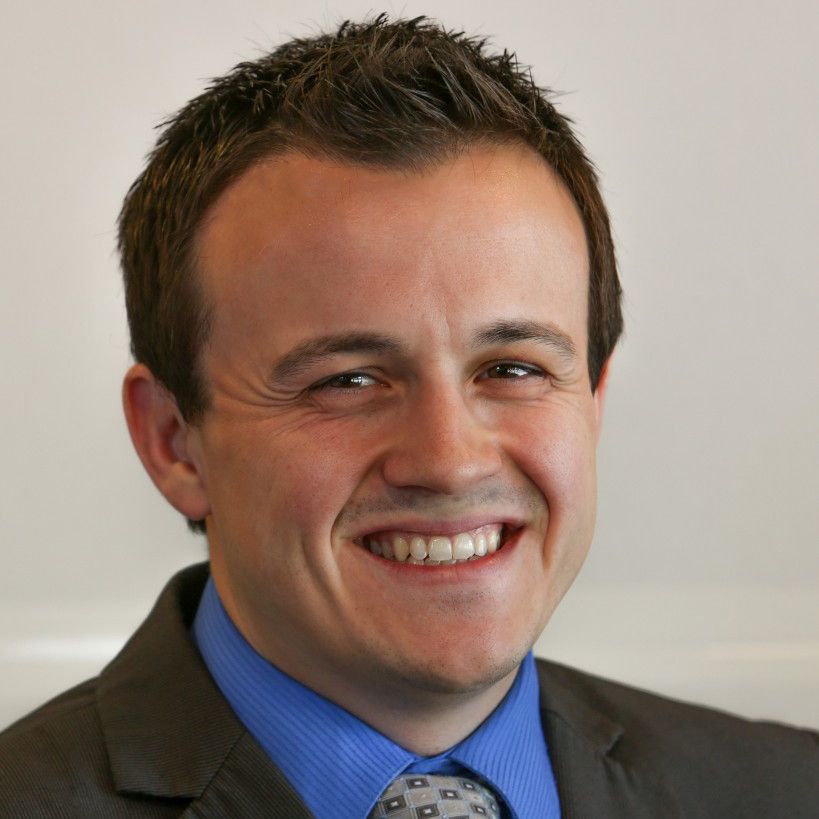
Brandon Ruscoe ’09, Associate Broker, Merced Yosemite Realty: My family moved to Merced in 1994. At that time there were the first rumblings of a 10th University of California in the Valley. It just so happened that it opened in 2005, the year I graduated high school. Like many strange things in my life, the timing just worked out.
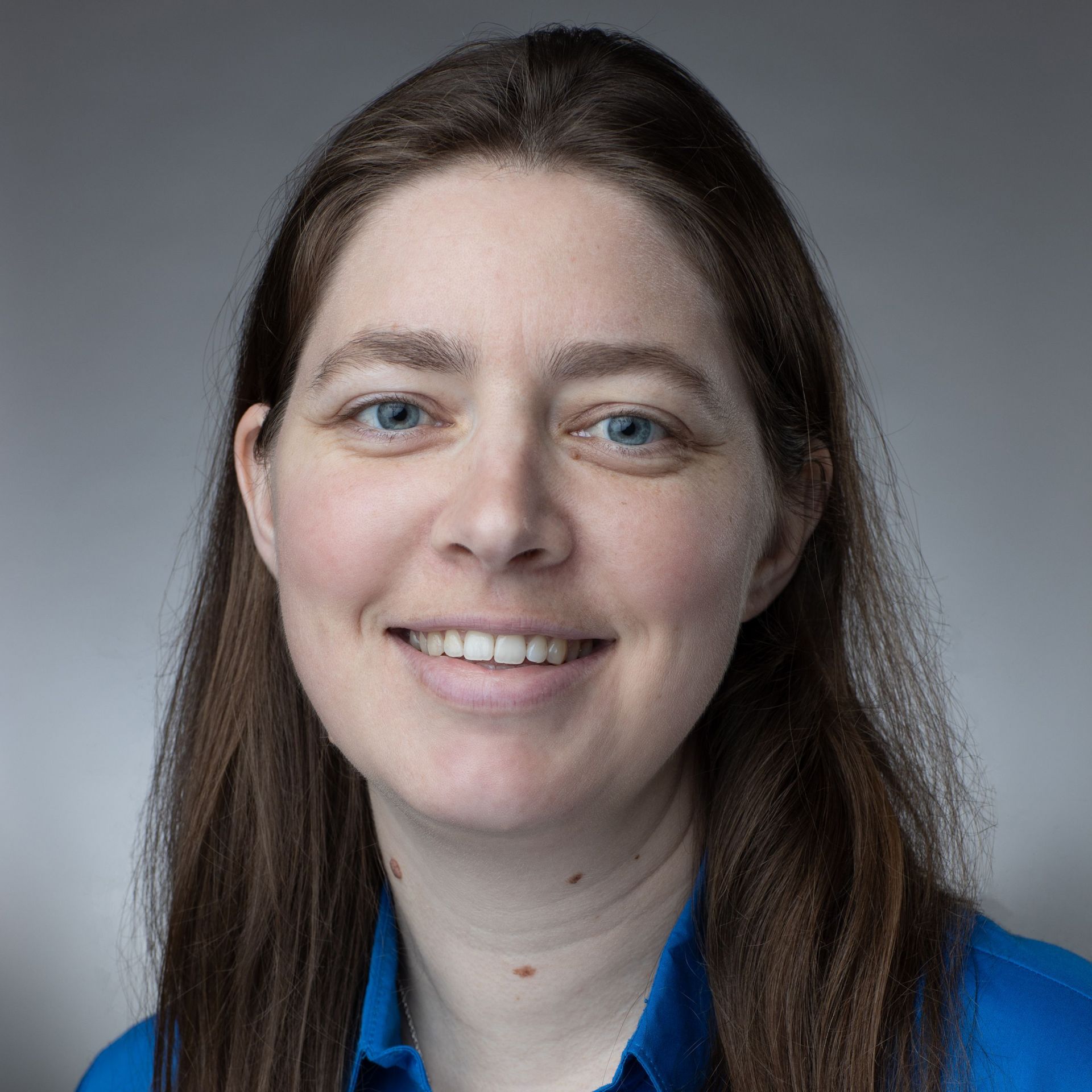
Anne Mahacek Hunter ’09, Research Associate, Santa Clara University: My family would take drives out to Lake Yosemite to see the development of the new campus. Being able to see the community join together in support of bringing the newest UC campus to Merced brought me great pride and appreciation for the opportunity to attend a UC in my own backyard.
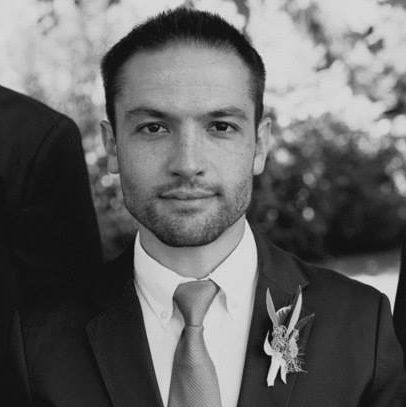
Omar Chowaiki ’09, Member Services & Sales Manager, Napa Brands at E. & J. Gallo Winery: I jumped on the opportunity to be a member of the founding class. Those opportunities don’t present themselves every day.
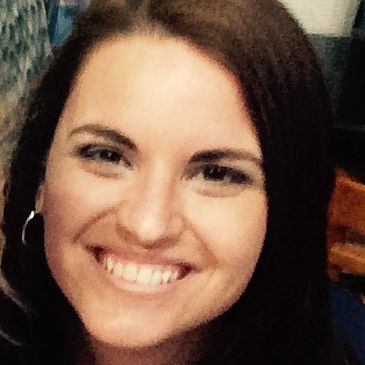
Heather Poiry Hopkins ’09, Senior HR Process Specialist, E. & J. Gallo Winery: I first learned about UC Merced at a college fair in 2001 as a freshman in high school. Other universities had fancy booths with tons of brochures and people dressed in swag. UC Merced’s booth had large printed images that were drawings. I was immediately attracted to it. The drawings were renderings of what it would be.
That day I was told that UC Merced had been a dream in the making for a long time, and I knew in that exact moment I wanted more than anything to be part of that dream. They had one piece of swag, a blue and gold banner. I took it home and hung it above my bed, and I still have that banner today hanging above my desk, reminding me to always dream big.
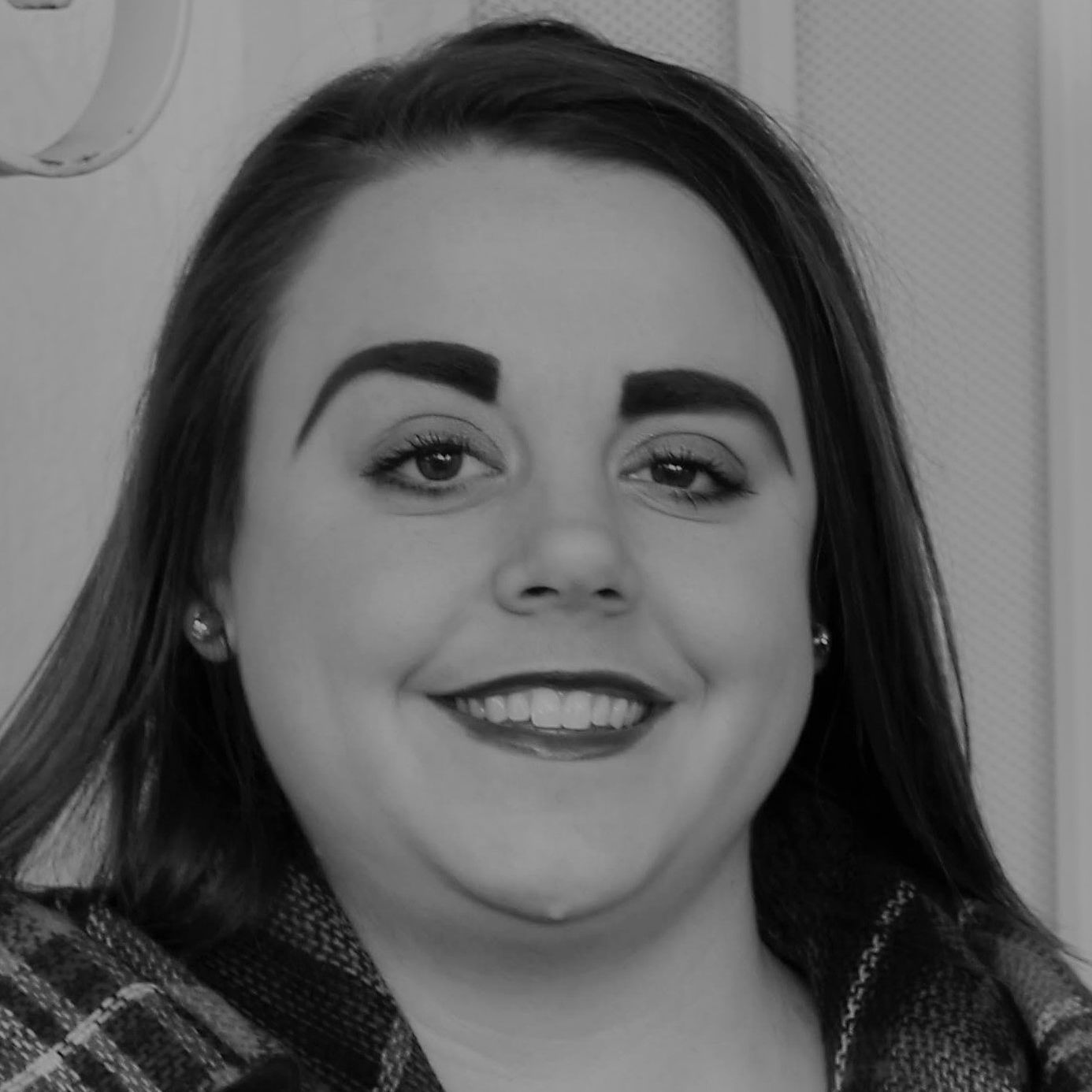
Katie Hatfield ’09, Compliance Anaylst, E. & J. Gallo Winery: I was accepted and invited to attend the first Bobcat Day held at Lake Yosemite. The energy was infectious, and I just felt like I wanted to be a part of whatever was being built.
When prospective students arrived at Bobcat Day in 2005, they were met by founding faculty member Christopher Viney. In an effort to exemplify the 'Bobcat spirit,' Viney dressed as a Bobcat, complete with white gloves, a tail and face paint.
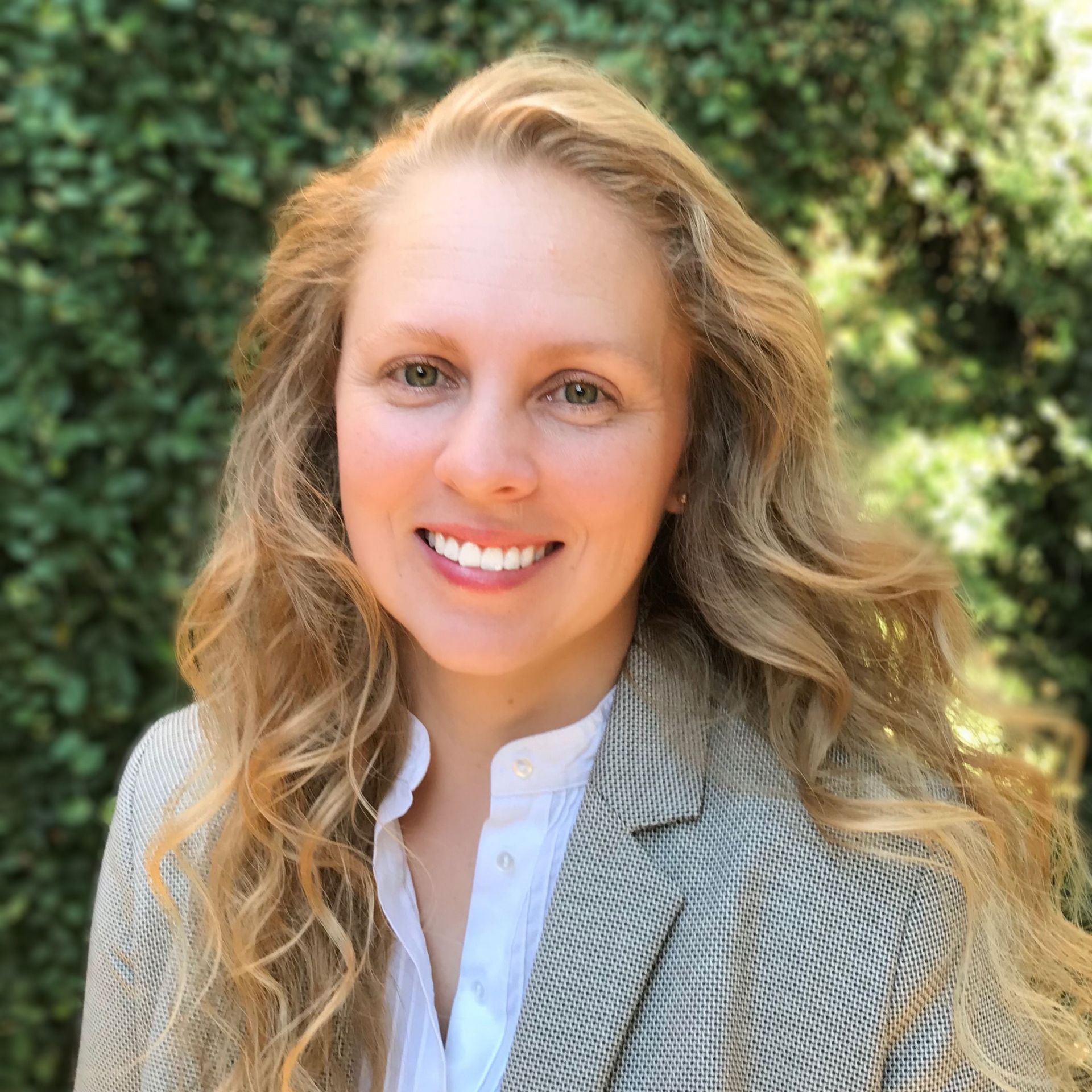
Lauren Schiebelhut ’09, Postdoctoral Researcher, UC Davis: I attended Fresno City College and had a guaranteed transfer agreement with UC Davis, but before I made the transfer to Davis, someone from UC Merced visited Fresno City College. As a first-generation college student and transfer student I felt insecure about my preparation, but the encouragement and support I received from faculty and students at UC Merced made me feel at home on campus.
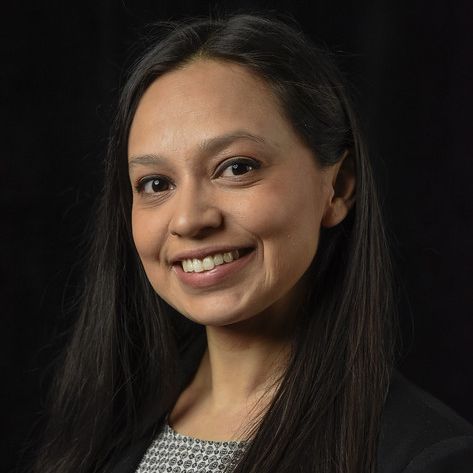
Dr. Maricela Rangel-Garcia ’09, Internal Medicine, Sacramento: My dad, Dr. Juan C. Garcia, was the first one who told me about UC Merced. He brought me to the site before ground had even been broken and told me one of best universities was about to be built. He encouraged me to take a chance on a new place and told me it would be a ‘once in a lifetime’ opportunity.
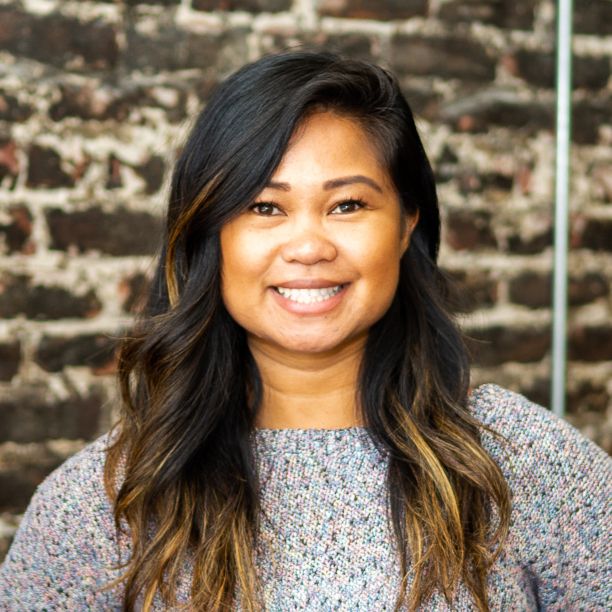
Jo-Anne Rodriguez ’09, Head of Customer Success, Shippo: I visited all the UCs and when I visited UC Merced, this will sound cliché, but it just spoke to me. It was probably the tour guide doing an amazing job telling me about the campus, but I could see myself being part of the building blocks of UC Merced’s future, and I was extremely excited about that.
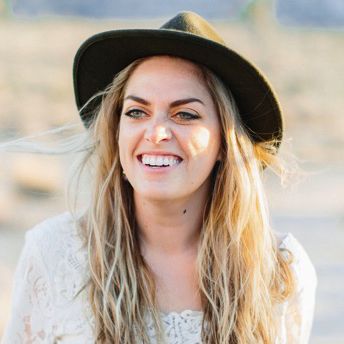
Jackie Shay ’09, Ph.D. Candidate, Quantitative and Systems Biology, UC Merced: To be a part of a world-class institution from the beginning and experience its growth was a unique opportunity I could not pass up. My first time visiting UC Merced was in April 2005, when the campus was no more than timber bones. I stood on North Lake Road gripping a chain-link fence, and I said out loud ‘I have to be a part of this.’
Brandon Ruscoe: I was headed to UC Santa Cruz until the night before I had to confirm my acceptance. I took some time that night to think about what I wanted more. I weighed perceived adventure and perceived independence vs. uniqueness and novelty. I woke up that deadline morning having decided that UC Merced would make for a better story in my life.
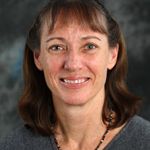
Peggy O’Day, Founding Faculty, School of Natural Sciences: Even when we opened up, I felt we were really underprepared and understaffed, both faculty and support staff. It was kind of scary wondering ‘What are the students going to think? Are they going to realize there’s not much here and take off?’ It was a bit daunting. But we quickly realized the students had as much of a pioneering spirit as the faculty and graduate students did.
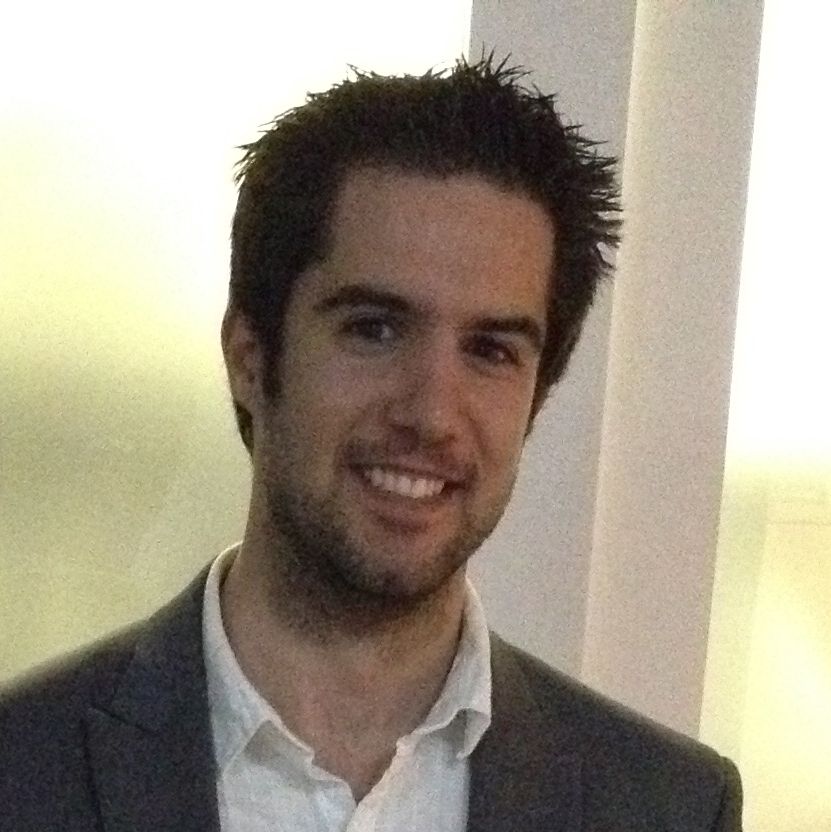
Michael Oliveira ’09, Manager of Systems Engineering, Acutus Medical, Inc.: My first day on the UC Merced campus was a couple weeks prior to the official opening. I was one of five students who had taken a job at the UC Merced Library as a student assistant. We spent those early weeks helping to prepare the library to be the central academic hub of the campus. I had to wear my hard hat whenever I traveled anywhere outside of the main library offices!
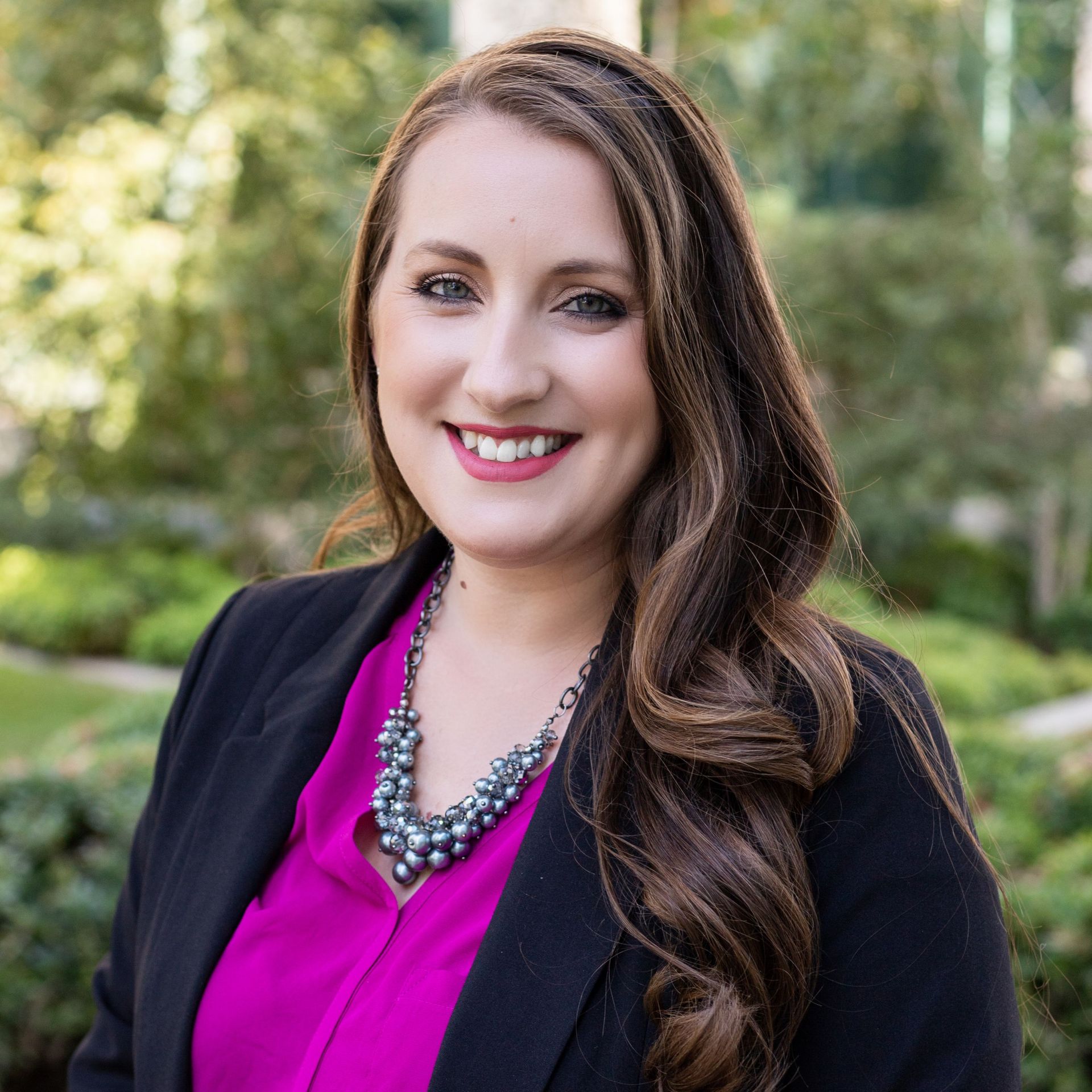
Brenda Peña ’09, HR Specialist, Sierra HR Partners, Inc.: Orientation felt refreshing. It probably had to do with the campus being new and having that ‘new car smell.’ As I stepped on campus, I had butterflies in my stomach. I was finally going to get to live on my own. I was excited — no curfew!
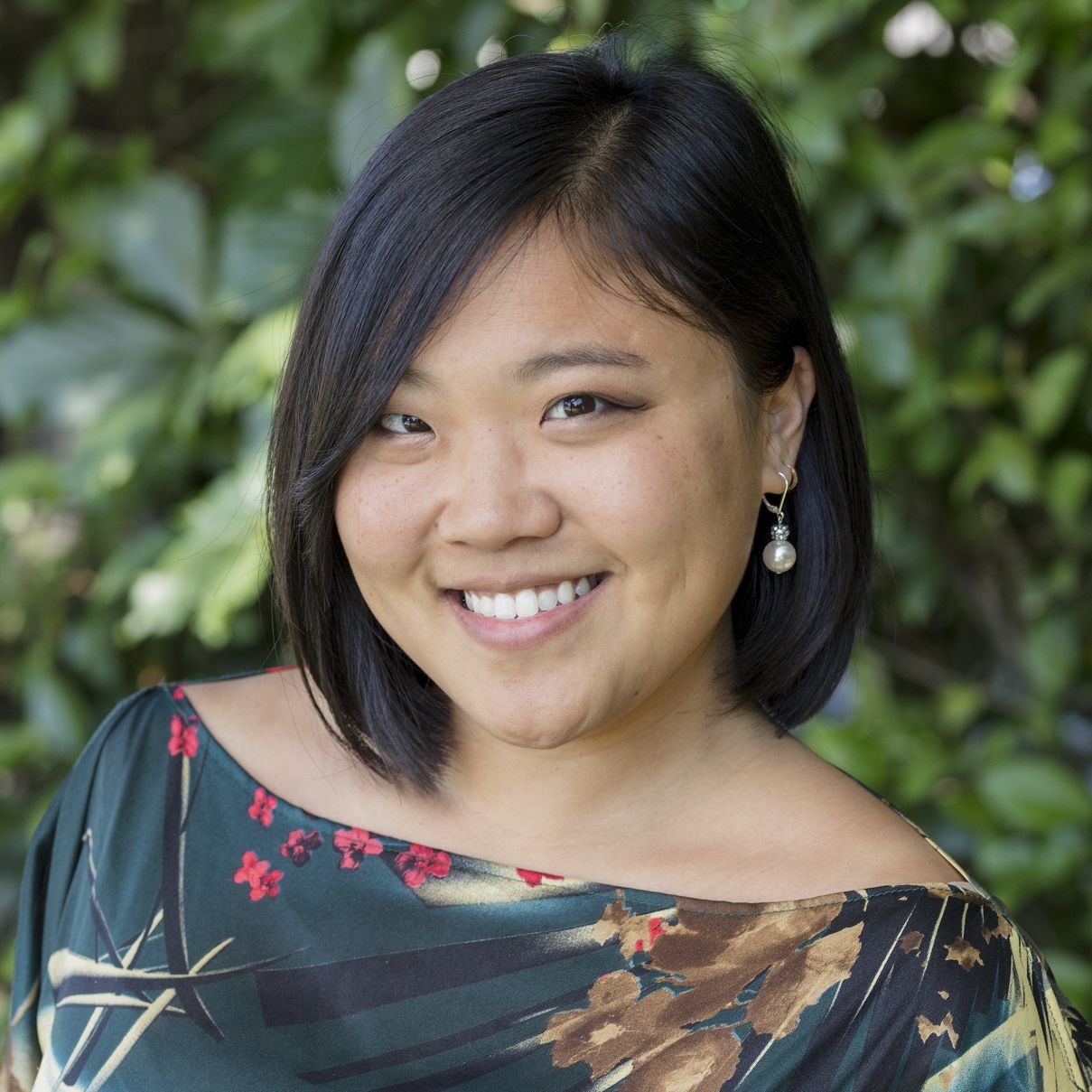
Liz Kang McKinney ’09, Real Estate Agent, Compass: It was in the middle of nowhere. Orientation made me feel like I was starting high school all over again — there were so few of us. I think at that point, the total number of students at UC Merced was the same as the high school I went to. I remember feeling motivated to get through school and back home as fast as possible.
Founding faculty members David and Anne Kelley describe
what it was like setting up their labs for conducting world-class research shortly after they arrived on campus in 2003.
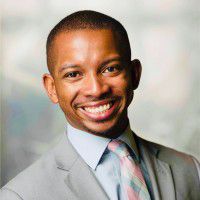
Rodney Nickens ’09, Policy Manager, Nonprofit Housing Association of Northern California: Orientation was exciting and I got to meet so many interesting and diverse students from all over California from similar socioeconomic backgrounds. Many of us were the first in our family to go to college. I was very nervous on my first day, but many of us were, and we all felt like we were in on this experience together.
Brandon Ruscoe: Being a responsible human being, I missed the orientations. In fact, so many students missed the orientation they had a final emergency one in Fresno. So, there I was, second to the last guy in line, and the smart guy behind me says something to the effect of ‘Hey, did you know we even had to go to an orientation?’ Aaron Hill ['09] and I have been great friends ever since.
Omar Chowaiki: It wasn’t until meeting students, getting our class schedules set up and walking campus for the first time that I felt like this was really happening. Crossing the bridge with our white polos felt more like summer camp than college. We were a small class that got to experience a lot of firsts together.
One of those firsts was the Scholars Bridge Crossing — the oldest tradition at UC Merced. New students walk the bridge as faculty and staff cheer them on. Though the walk was short, it was a monumental moment for everyone associated with the university.
Anne Hunter: That first day during Bridge Crossing made the campus feel real. It was full for the first time, with the students, faculty, staff, family and community members that made it possible.
Brenda Peña: As I was crossing the bridge, I didn’t know what to think. I just felt in my gut that I had made the right choice by coming here. I knew that I would leave an impact and that I’d make lifelong friends.
Katie Hatfield: I just had an overwhelming sense that I belonged there. It was so powerful to be part of history and to be part of a story bigger than just my own.
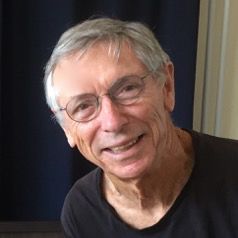
Christopher Adams, Director of Long Range Planning for UC Merced: I remember my emotions on the day the campus opened officially and [Chancellor] Carol Tomlinson-Keasey led the first students across the bridge. I was crying.
Michael Oliveira: I was beaming with pride and excitement. We were making history that day.
Jo-Anne Rodriguez: Crossing the bridge was monumental, and I truly felt like I was part of history. I didn’t even understand the impact UC Merced could have on me and everyone else after me. From that day forward, I have had no regrets about UC Merced or any doubts or ‘what is happening?’ moments. I absolutely love this place.
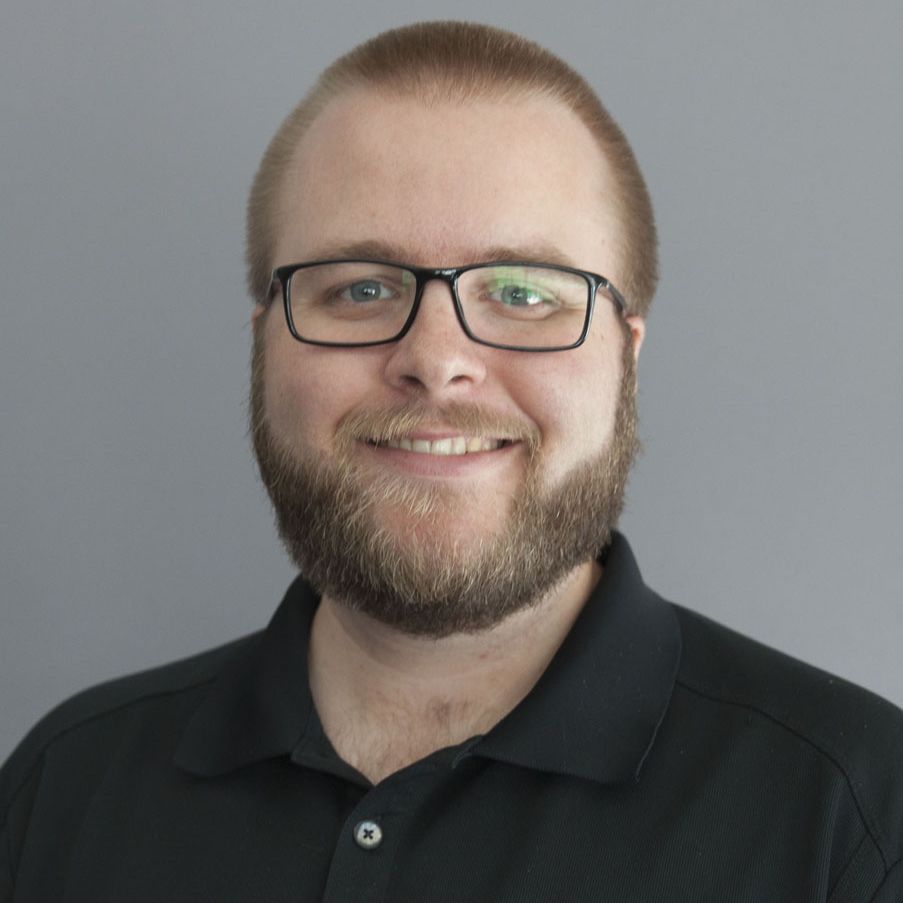
Ross Anastos ’09, Library Services Manager, UC Merced: I think the biggest ‘what did I get myself into’ moment was sitting in lawn chairs on a dirt mound outside our dorm, looking across Ranchers Road at cattle grazing to the south of Lake Yosemite. Growing up in San Francisco meant that just about everything about living in Merced was different, but in a good way.
Jackie Shay: Most of us knew why we came here, and we knew what we were getting ourselves into. We knew this experience would be nothing like other college experiences, and we were eager to start our journeys and build this campus from the ground up. We knew it would not be easy. We knew there would be obstacle after obstacle, but the goal was what we came here for and we were going to get the most out of our experience while we reached that goal.
PART II
A World of opportunity
at your fingertips
These students were pioneers in every sense of the word — they were the only students in the country who were attending a brand-new public research institution. With a blank slate came struggles and opportunity. But more importantly, the Class of 2009 bonded, producing a family-like culture and a “roll with the punches” attitude.
Brenda Peña: I remember my first day of class. Philosophy! Our class was held in the library. During that time, we didn’t have actual classroom buildings — they were under construction. Instead, we had classes of 20-30 students in the library separated by office dividers. While we were listening to our lectures, we could hear the lecture next to us.
Liz McKinney: I remember being frustrated that the criteria of our majors was constantly changing. One semester we’d need a class, the next we wouldn’t. On the flip side, they were really flexible and open about alternative ways to get credits. I used my job at a local froyo place to gain credits. That was an amazing feeling — to see a path to my goal and the support to walk down it.
Rodney Nickens: It was most certainly a struggle during this time, but I relied on my faith, the support from my family and friends, and my own grit and resilience to get through tough times. I still look back to those moments when I experience setbacks and disappointments [now].
Heather Hopkins: The biggest struggle we faced at UC Merced was not being known. Having no alumni reputation to stand on, we had to create one for ourselves. I can recall going to job fairs and employers looking at my resume and asking more about my university than me. That was hard to bear at times, thinking ‘How can we compete?’
Maricela Rangel-Garcia: Without upperclassmen I had to really figure out what was right for me, taking on a pre-med pathway and learning how to network on my own — going to conferences and saying I was from UC Merced was a hardship in and of itself. People would ask what kind of school it was and where it was located and I quickly learned I was an advocate for this new, up and coming university.
Anne Hunter: Being part of the first class, we didn’t have upperclassmen who had been through those courses or who had those professors before to help give us guidance. I feel the struggles of being part of that first class helped make us a family. It took time to get used to seeing new students on the campus the following years, like we had been an only child and we were learning how to share again as the campus grew.
Jackie Shay: To be honest, everything was a struggle. We did most everything on our own on top of our course work and jobs. Now there are staff, departments and programs for students. Back then, we were the departments and we were the ones serving our community, all for the good of our collective experience and the growth of our campus climate.
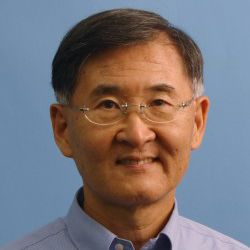
Sung-Mo ‘Steve’ Kang, UC Merced Chancellor (2007-2011): Despite so many challenges, faculty, staff and students were equipped with pioneering spirit. Many visitors envied this environment. The first graduating class also demonstrated enormous can-do attitude and a determination to overcome hurdles and succeed. Students also pioneered fundraising for the campus on their own.
Omar Chowaiki: I remember the energy on campus, as we really had to be self-motivated to make the best of our experience. Everything from a fun house party to founding the business society and Greek life — what we were going to get out of our experience at UC Merced was in our hands.
Brandon Ruscoe: Year one was cool. The library third floor was still under construction while we were trying to take classes on the second floor. It was like English and shop class at the same time.
"I JUST HAD AN OVERWHELMING SENSE THAT I BELONGED THERE. IT WAS SO POWERFUL TO BE PART OF HISTORY AND TO BE PART OF A STORY BIGGER THAN JUST MY OWN."
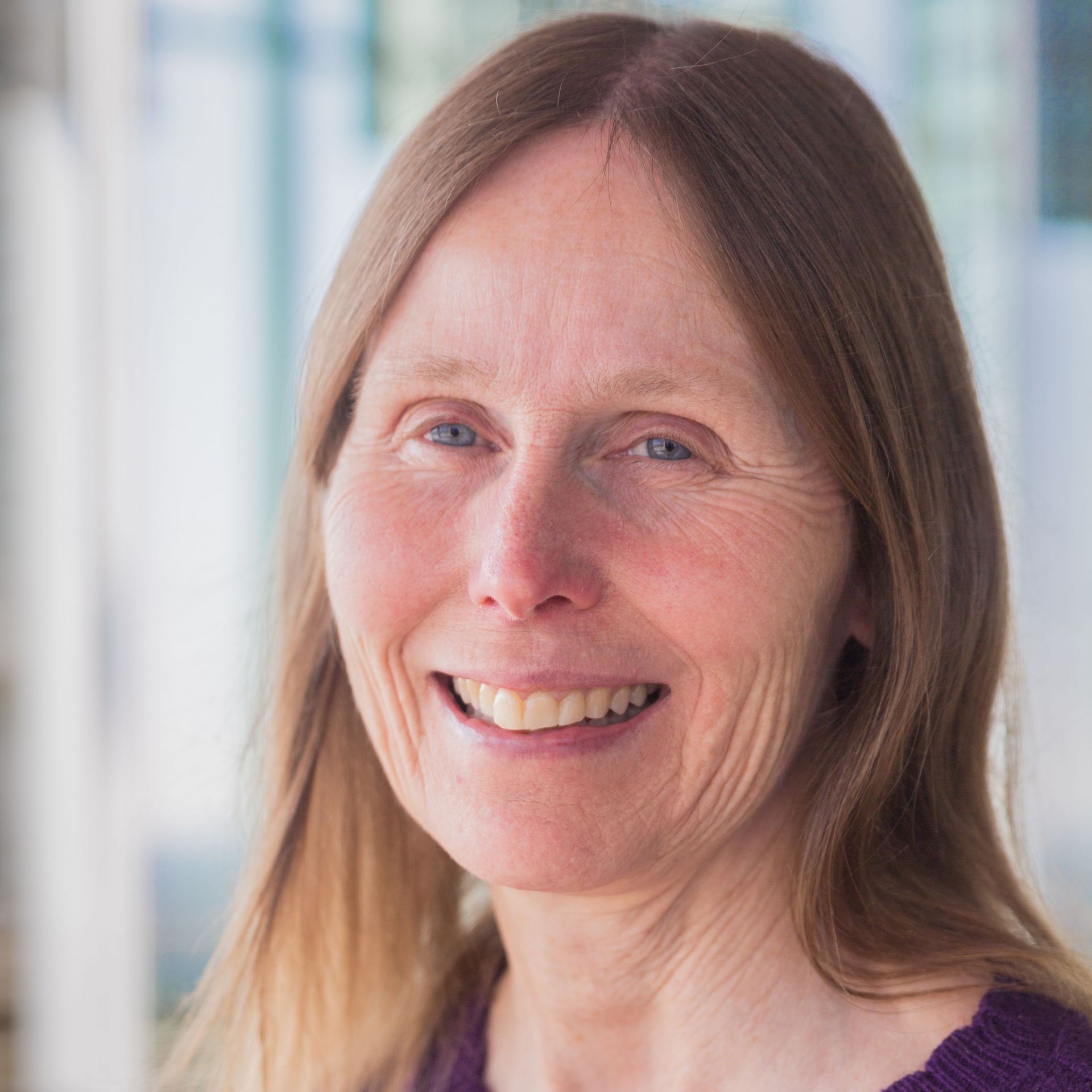
Anne Kelley, Founding Faculty, School of Natural Sciences: I very clearly remember teaching freshman chemistry in the California Room, and I had 80 students in there. That wasn’t a bad place to teach. But then the labs, we had to bus them out to Castle [Commerce Center] where we had set up some temporary labs. When we were developing the curriculum, we had to be very aware of the fact that we would not have real lab facilities. We had to design them to be really simple.
Lauren Schiebelhut: While so much of UC Merced had to be built from scratch, the exciting part was that I was able to be involved in creating and sculpting part of the organization and the culture that carries on at UC Merced today.
Ross Anastos: Coming to UC Merced as part of the first class, we were told we were pioneers. I think more importantly was that we truly believed it. It was intrinsic to what we did and how we thought about being at a new university.
Heather Hopkins: I absolutely felt like a pioneer of a brand new UC. It created a mentality that if it didn’t exist — which nothing did — create it, don’t complain about it. I truly believe that those of us who embraced this entrepreneurial mindset saw UC Merced for its assets versus its deficits.
Jackie Shay: The pioneer spirit was and continues to be a strong force of energy at UC Merced. UC Merced is what you make it, literally! If you wanted a Super Smash Bros. gaming club, you made it happen. Nothing was there in the beginning, so we all knew we had to build it from scratch.
As the students moved further from the first day of school and closer to commencement, the amount of change they experienced only increased.
Brandon Ruscoe: By our third year, we had a gym that was empty all the time, so it was like having membership to an exclusive health club.
Michael Oliveira: It was incredible to see the annual transformations. All classes were held in the library in Fall 2005. The Classroom and Office Building opened in Spring 2006. The Science & Engineering Building opened in Fall 2006. The quad was landscaped shortly after that. It was surreal to see the academic pad becomes less and less like a construction site as the years passed.
Katie Hatfield: I most enjoyed watching the campus grow. Each semester there was a new building opening, new classes being offered and more students joining. Nothing was ever stagnant or expected and I enjoyed never knowing what was going to happen next.
Ross Anastos: After the constant flooding in the dining commons, having to walk up the emergency exit stairwell for classes in the library and getting emails about cattle getting loose and blocking the roads, I think a lot of the folks in the class really rolled with the punches through much of the other changes on campus over the years.
Brenda Peña: No other UC campus was afforded the opportunity to have small class sizes. Each class was intimate. Each professor knew us by first and last name. We really got to know one another.
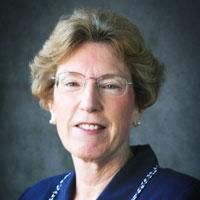
Jane Lawrence, Founding Vice Chancellor for Student Affairs (2002-2014): One of my memories is the Leadership Awards the spring right before [the 2009] commencement. There were so many outstanding students in the class and selecting the winners was extremely difficult. But what stood out for me that evening was the tremendous support and respect all of the nominees showed for each other. As winners were announced, the group cheered and celebrated the winners’ accomplishments while recognizing that so many students had contributed to making this small little campus such a special place where everyone, regardless of background, had an opportunity to lead and succeed.
Brandon Ruscoe: The first class, we were like an island of misfit toys who were all just a little bit different than our high school peers. I think that inclination toward risk taking and possessing an outstanding amount of grit really aided our class when we had to face the cold, dark economy in 2009 when we graduated.
Jo-Anne Rodriguez: What I remember most about UC Merced was the constant encouragement that the university was ours and what we did would make an impact on its future. It was echoed across every single professor and administrator — it was empowering. The encouragement enabled me to join many different clubs and lead within them. Even further, this encouragement gave the ‘Dream Team 17’ all the empowerment it needed when we went after Michelle Obama as our commencement speaker.
PART III
CAMPAIGNING FOR
THE FIRST LADY
Pioneers for change — if nothing else, the Class of 2009 prepared for graduation day knowing they were helping change the landscape of higher education in the San Joaquin Valley, the state and nationally.
Three thousand miles away, another pioneer was settling into her new position as first lady of the United States. Just four months before UC Merced’s commencement day, Michelle Obama stood by her husband as he was inaugurated as the 44th president of the United States. The campaign slogan that had helped President Barack Obama race to victory was simple: “Change we can believe in.”
The students believed in themselves and set their sights on making the FLOTUS their commencement speaker. If helping to launch a university was a daunting task, getting the first lady to come to UC Merced would be a piece of cake, right? Thus began the “Dear Michelle” campaign — nearly 1,000 valentines and a video showcasing why Michelle Obama should spend time in Merced on May 16, 2009.
Heather Hopkins: Everything Michelle stood for, we represented. First-generation, low income, high engagement with our community — that was us. We represented generations of families and a community who poured blood, sweat and tears into us and this university in the hopes that everyone’s future would be brighter. To most of us, Michelle was such an obvious choice, and we truly believed if she knew our story, it would be obvious to her as well.
Jo-Anne Rodriguez: The Dear Michelle campaign started off as ‘Operation Lady Bird.’ It was our secret code while we worked on it. We worked on it secretly every night after the ASUCM office closed, and it was invigorating. I think the administration thought we were crazy, but [they] half hoped it would work so they encouraged it.
Liz McKinney: The tables! Those guys were out there behind the table trying to get everyone to sign a card, just shooting for the Michelle Obama pipe dream. I thought it was a long shot at best, but I totally wrote a card. I was excited for commencement — who wasn’t?
Jackie Shay: I helped with tabling for weeks to have our students write adorable Valentine’s Day cards to Michelle. We collected and mailed red cards filled with hearts, love, and the dream that she would come to speak to our graduating class. I also helped create the ‘We Believe in Michelle Obama’ video we sent her to show her what her presence would mean to us.
Anne Hunter: The Dear Michelle campaign demonstrated the dedication and perseverance that helped define the first class of students at UC Merced. Students who are part of starting a brand-new campus don’t back down easily when others tell them something is unlikely. Even though having Michelle Obama as the commencement speaker seemed like a far-fetched idea, it didn’t stop our class from joining together to write letters and show not only our community, but the country, what UC Merced had to offer.
Rodney Nickens: I still have very fond memories of participating in the Dear Michelle campaign, writing letters and Valentine’s Day cards, and lobbying the administration to get her to come. It was a very exciting time and we were so amazed when she actually agreed.
Jane Lawrence: I was with Chancellor Kang the morning when he received the phone call from the White House telling him that they were about to announce that Michelle Obama would be our commencement speaker. We both were overjoyed for our students and for our young campus to have such an honor. Then our lives were completely upended over the next few months as the campus struggled to get ready for her visit!
Lauren Schiebelhut: I remember thinking how much of an honor it would be for her to speak at our commencement, and that this would put UC Merced on the map, no longer just the geographic region between the Bay Area and L.A.!
Heather Hopkins: When it was announced Michelle chose us, most of us cried — students, staff, faculty, parents, everyone. It was so symbolic of everyone’s hard work being acknowledged and recognized at a national level by our first lady.
Omar Chowaiki: I remember the Secret Service visiting campus several weeks leading up to commencement, trying to slyly look around and inspect the scene as if unnoticed. The only problem was that the student body in ’09 was so small — we knew everyone on campus, so spotting them wasn’t all that hard.
Steve Kang: [We were fortunate] to get the environmental permit just before the commencement ceremony, which enabled preparation of the site for the event that had attracted so many people. Had we not gotten the permit, we would not have had a proper land space for the ceremony. All the stars lined up for this historic ceremony.
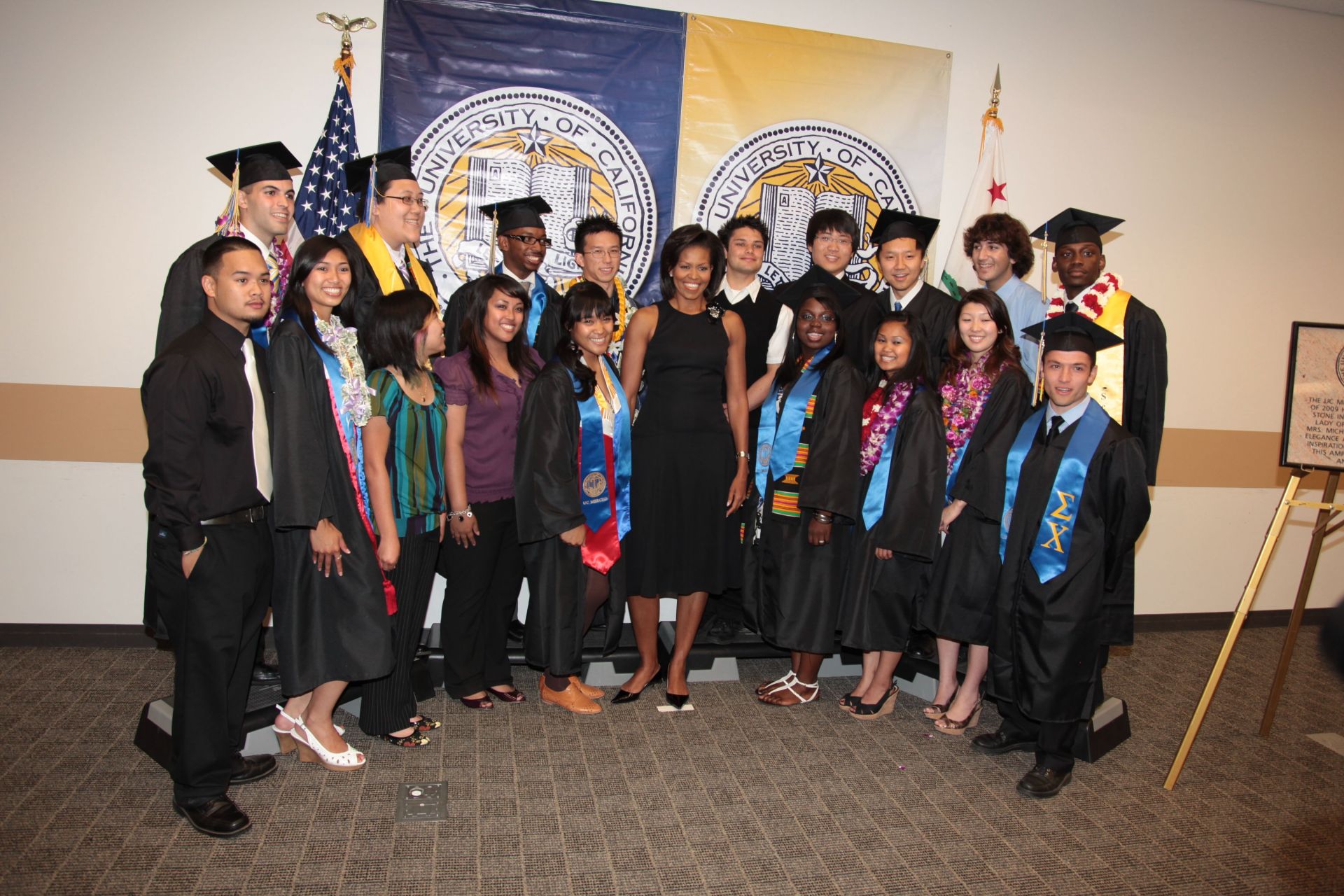
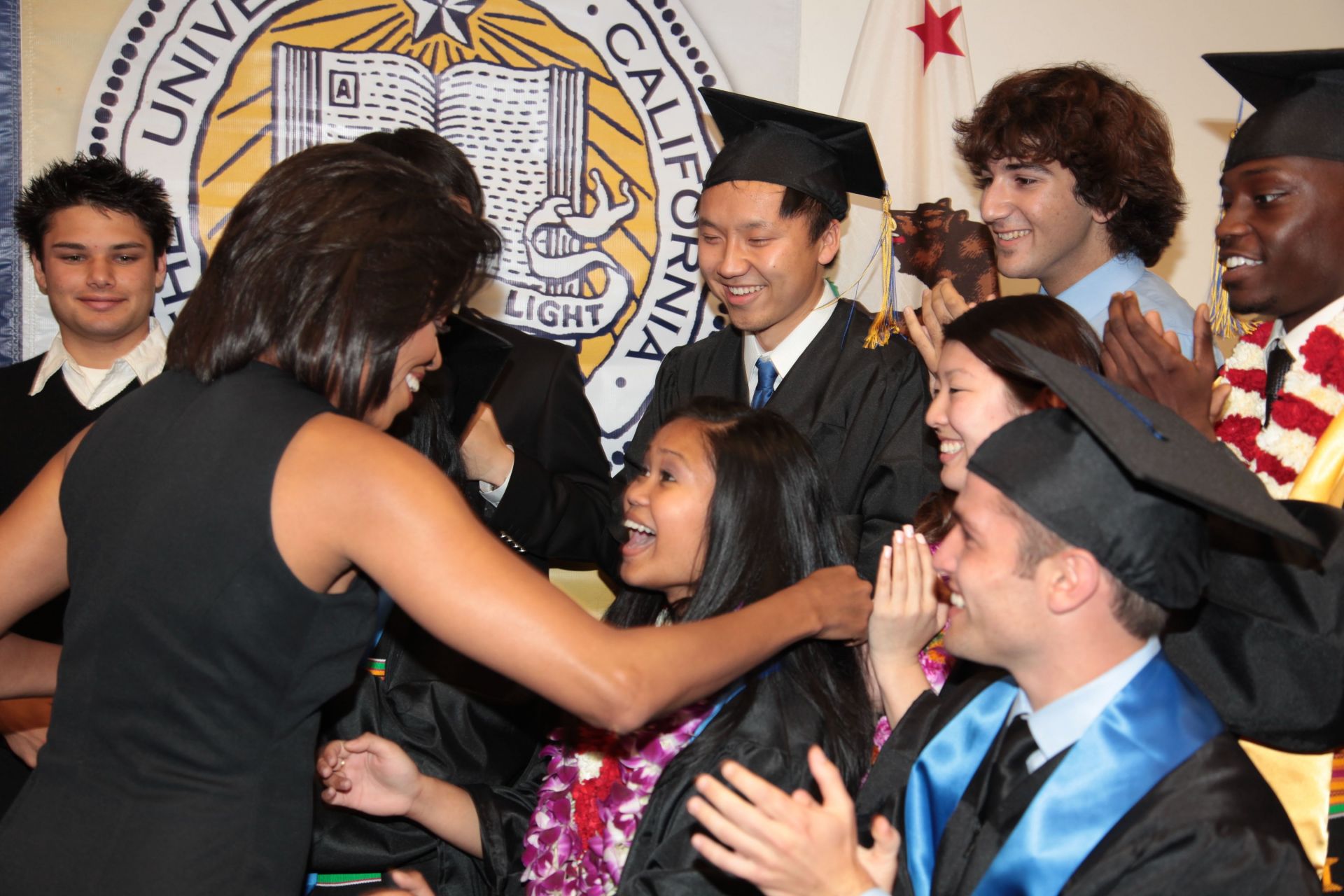
Several graduates were able to meet with First Lady Michelle Obama before the commencement ceremony, including Jo-Anne Rodriguez.
Jo-Anne Rodriguez: Meeting Michelle was everything and more. We thought we needed to stay contained in our spots on the picture bleachers, but as soon as she came in, she called us ‘crazy’ and then went in to hug each and every one of us individually. She smelled like heaven.
Rodney Nickens: I was definitely excited and nervous when I actually got to meet her and give her a hug, but she was so inviting and warm. It was a beautiful moment and absolutely everything I could have envisioned.
Jane Lawrence: I remember starting to cry, since we’d been hoping she’d accept the students’ invitation and had been working for months to get prepared. But it was so exciting to actually have her on campus.
Omar Chowaiki: I remember commencement day, waking up in the morning and realizing that I was going to meet and present to First Lady Michelle Obama in a few hours. While my presentation was brief, I can’t remember a word I said, just her face smiling and saying thank you. No meeting or presentation has been quite so stressful since.
Michael Oliveira: I remember our walk into the venue through the Beginnings sculpture and along the side of the creek that runs through campus. [We were] a class that had taken the leap of faith to come be pioneers at a new university, that built a campus culture from scratch and that successfully courted the first lady of the United States to be our commencement speaker. We had created a legacy for ourselves!
Beginnings Endures as a Campus Icon
“The quad at UC Merced is an empty stage crying out to make a statement,” acting Chancellor Rod Park said in September 2008. “This empty stage presents a unique opportunity to say metaphorically why the university is here and what it hopes to accomplish.”
Park, who died in 2013, and his wife, Cathy — with generous donations from Bob and Marie Gallo and John, Joseph and Fred T. Franzia of Bronco Winery — brought the Carol Tomlinson-Keasey Quad to life with the help of sculptor Aris Demetrios, Park’s college classmate at Harvard.
Beginnings — now a campus icon — was crafted to serve as metaphors of both the embrace of a caring university and the germination of a seed.
“A seed protects what is inside until conditions are right for the next phase of growth, so that when students walk through the base of the enfolding arms, they emerge ready to blossom and experience a new beginning,” Cathy Park said.
When Demetrios arrived on campus with a full scale 2-D image of the 40-foot Beginnings, the plan was to place it at the opposite end of the quad from where it now rests.
“We tried it and tried it, but it wouldn’t marry. Then we got to the other end [of the quad] and I said, ‘It is better.’ Then we rotated it, and when it got halfway around, it sang,” Demetrios said. “That’s why it sits there. It works majestically. The whole notion of Beginnings is what the university is all about, ending one life and beginning a new one. It was a portal and a symbol for their graduation.”
“The act of passing through the Beginnings sculpture for both incoming freshmen and outgoing graduates is truly significant as they begin campus life and also life after graduation,” said Sung-Mo “Steve” Kang, who was chancellor when Beginnings was installed. “I deeply appreciate the donation and the committee for supporting the vision and the project. I believe this sculpture is a great symbol for UC Merced.”
Demetrios said Beginnings is one of the most rewarding pieces he has produced in his career.
“I made a meaningful thing that has endured and been embraced by the people who use it,” Demetrios said. “You can’t ask for anything better than that.”
Brenda Peña: There was so much security on campus that day — it was almost scary — with snipers on the rooftops. I remember everyone taking pictures of the snipers! It was surreal. It was great.
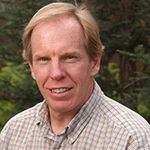
David Kelley, Founding Faculty, School of Natural Sciences: It’s a rare circumstance when you go to commencement and there are snipers on all the tops of all the buildings. That’s not the usual commencement. But [having Michelle Obama there] gave us a sense of legitimacy that we are a great university and it built great momentum at that point.
Brandon Ruscoe: All politics aside, having the first lady at our commencement was an absolute honor. It was as envisioned — just 20 degrees hotter and extra sweaty.
Ross Anastos: I can’t remember if it was originally scheduled for the morning or evening, but it ended up being midday and the heat was almost unbearable. I think that’s the only thing that anyone in my family remembers with the most clarity — the heat. Sitting in the Bowl with no breeze, being told not to stand up because of snipers, and the event staff was passing out cases of water. It was quite the experience.
Maricela Rangel-Garcia: My grandparents were in their 80s and toughed it out in the 105-plus- degree heat. I remember someone announced that we were allowed to remove our gowns and I remember people passing out bottles of water. The only problem was the bottles of water were hot. I told myself to breathe, and to concentrate on walking across the stage. Though it was so hot, I loved graduation. It was everything and more.
Jackie Shay: We knew she would be inspired by our story, our journey, and what our university and first graduating class represented. In fact, during her speech she said, ‘You want to know why I am here today? Because you inspired me.’ We identified with her in so many ways, and we only hoped our call for her would convince her of that.
Brenda Peña: I remember her stating that we were ‘the hope of our nation.’ I was shocked! Us? From UC Merced? The hope of our nation? That was definitely impactful!
Michael Oliveira: There was a blurb from [Michelle] Obama’s speech that remains with me to this day. She said: ‘Remember that in exchange for those blessings, you must give something back. You must reach back and pull someone up. You must bend down and let someone else stand on your shoulders so that they can see a brighter future.’
UCTV's report from the 2009 commencement, including First Lady Michelle Obama's speech.
Liz McKinney: I’m sad that so many people left after Michelle Obama left. I’ll never forget that. The moment she left, you saw people leave en masse, like they didn’t care to watch us, the reason she was there to begin with.
Lauren Schiebelhut: The people who stuck around we knew were overflowing with pride for whichever graduate they came to support. A memorable day.
Steve Kang: I can recall that this event was internationally publicized — CNN relayed the entire event — and later when I visited Capitol Hill in Washington, D.C., many elected officials recognized me as chancellor of UC Merced by saying ‘Oh, that is where Michelle Obama went.’
Peggy O’Day: [The first commencement] was a huge step, and having Michelle Obama was icing on the cake. I couldn’t believe that the student campaign worked; I was completely shocked. I guess I shouldn’t have been, because those students were really passionate about what they were doing and the campus, and that came through.
Heather Hopkins: To me, when we did the ‘Dear Michelle’ campaign, and won, it was such an emotional moment. It meant acknowledgment that we existed, we were worth it, and out of an entire nation of possibilities, we were the chosen ones. I know for my class, that meant the world to us. It felt like, we did it. We got recognized and we earned the national spotlight for everyone.
PART IV
EMBRACING THE EMERGING
BOBCAT LEGACY
The spotlight on UC Merced has grown significantly since that scorching day in May. The New York Times labeled UC Merced ‘the future of the University of California.’ The university continues to vault up some prestigious national rankings and make impressive debuts in others. Research by UC Merced faculty has found its way into National Geographic, Rolling Stone and NPR’s Science Friday, among others. Recently, student successes have gone viral, making appearances on Good Morning America and NBC News.
“We look back and we’ve come a long way, but we still have a ways to go,” said David Kelley. “We have to keep our foot on the gas.”
The Class of 2009 helped propel the university to new heights. Each class member can look back on their time at UC Merced with pride and know they will always be a Bobcat.
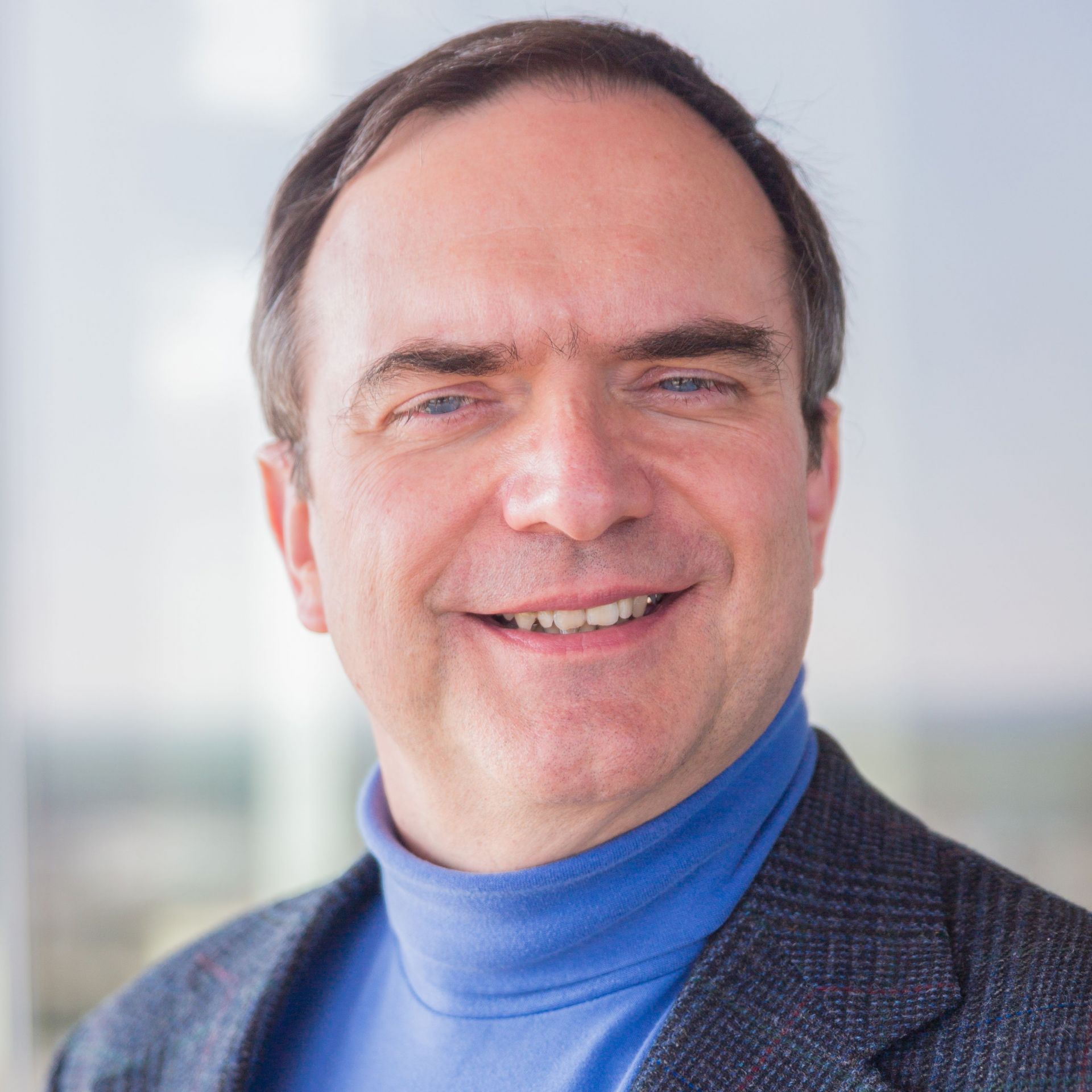
Christopher Viney, Founding Faculty, School of Engineering: There are many people I remember and the struggles they had to walk the stage, the tribulations, the joys. It’s not just oh, they’ve passed their physics class or their introduction to materials class. They came here perhaps a bit uncertain or against all the odds, whatever it was, and they made it and they are making it now in life. It’s not just a privilege, it’s a joy.
Omar Chowaiki: My time at UC Merced instilled within me a strong sense of personal responsibility for my future and doing what is right. Today, I’m a proud husband, father and homeowner, which certainly wouldn’t be the case without this foundation.
Jackie Shay: My life was forever influenced by my experience at UC Merced. I joke with my husband that UC Merced was my first marriage. I knew that first day on campus that it would always be a part of my life.
Anne Hunter: UC Merced provided many wonderful opportunities to help prepare me. While there were some struggles along the way, we were given a unique experience. We were able to have small class sizes to receive an excellent education from the dedicated, world-class faculty. We were able to make a difference and define the campus culture.
Michael Oliveira: I still beam with pride. You can hear it in my voice when I talk about UC Merced. I still feel a strong connection to the university. There’s no question that I was a part of a once-in-a-lifetime opportunity to help build and shape a University of California campus.
Brandon Ruscoe: Had I not gone to UC Merced, [my] family would not be here today. I would have a very, very different life. I would do it again 100 times over.
Rodney Nickens: I would absolutely do it again. I had a really enriching undergraduate experience that absolutely prepared me for graduate school and law school, as well as my current career as a political consultant and public policy manager.
Jo-Anne Rodriguez: I would 100 percent not be where I am today without UC Merced. I apply the experience I had there to many aspects of my job — different projects I lead, the way in which I manage my team, etc. I would definitely do it again, but it’s hard to see any other university doing it as well as UC Merced.
Founding faculty member Peggy O'Day says the sacrifices made by the university's first faculty, staff and students are the reason UC Merced is thriving today.
Katie Hatfield: I think my time at UC Merced encouraged me to always try new things and to not be afraid to dive in before things are settled and perfect. I have applied this to my career — there have been some changes and leaps I have made that I don’t think I would have if I had a fear of newness.
Brenda Peña: I always think of things like, what if I would have gone to a different campus and not UC Merced? But then I remind myself that it was all a part of His plan. I was planted in the Central Valley for a reason. So, I don’t second guess God’s plan — not even for one minute. If I wasn’t at UC Merced, I wouldn’t have met my husband and I wouldn’t have our beautiful children. I wouldn’t have had the beautiful friendships that I have now. If I could do it again, I would still choose UC Merced.
Liz McKinney: Even if you were like me, just gunning to get out, there was some pride in having the first footprint. I remember Michelle Obama saying we had a responsibility to come back and make Merced better, and thinking ‘Yeah right, I’m outta here.’ But since then, I hold the UC Merced name in pride and strive for success to add value to my degree and for all those who come after me.
Heather Hopkins: I would not be where I am today without UC Merced and all of the support that came with it. At graduation, Michelle Obama said, ‘So, graduates, when times get tough and fear sets in, think of those people who paved the way for you and those who are counting on you to pave the way for them.’ I made a commitment to never forget.
Ross Anastos: This October will be my sixth year as staff at the UC, and it’s been a fun journey. From seeing the campus grow out of a golf course into the university is it today has been quite the experience. I’m especially motivated because I’m in a position to be able to give back to my students, to help set them up for success in a professional setting after they graduate.
Lauren Schiebelhut: Those things that made me feel insecure — being first-gen, transferring from a community college, working a part-time job while going to college — ended up being my strengths, and the experience they provided helped prepare me to for success at UC Merced and beyond. You’re at UC Merced because you earned your spot.
Brandon Ruscoe: To new UC Merced students: Stay in the Valley, become an entrepreneur. Sure, you can go back to the metropolitan areas and become a corporate cog, or you can stay here, build something and really find your true potential.
Jackie Shay: I made this journey my journey, and I believe all incoming Bobcats should see their college experience at UC Merced in that light: It is whatever you make it. The keyword is make. Make this your experience. Make this the time of your life. Make a start to your learning, your career, and your relationships. Make connections. Make friends. Make memories. Make it all happen here. Make UC Merced yours.

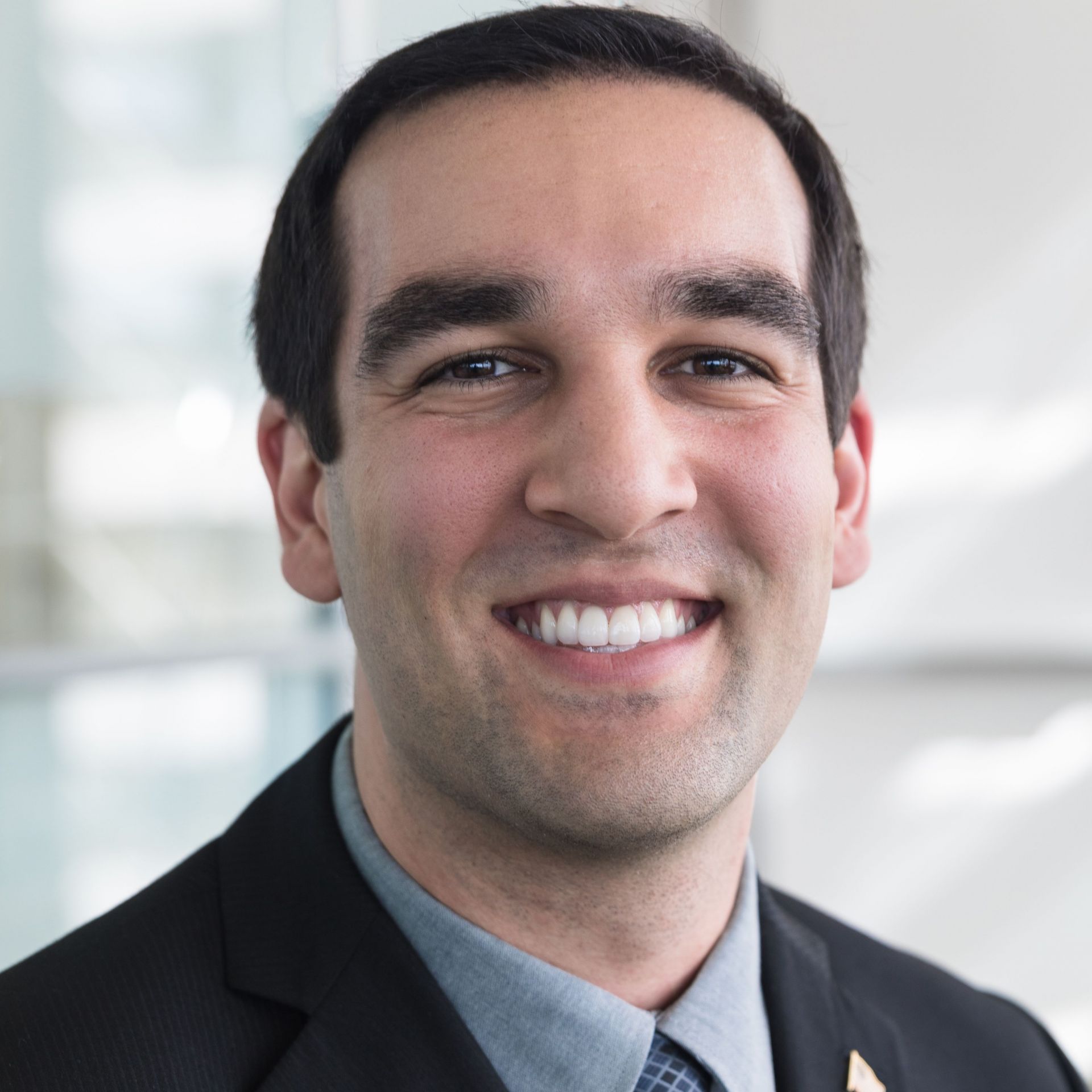
Kenneth Mashinchi is a Senior Public Information Officer for UC Merced. Prior to joining the university's public relations team, Kenneth worked as a television reporter at stations in Sacramento and Bakersfield.